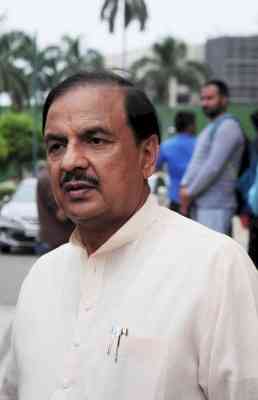2nd Regional Conference on Drug Menace – Challenges & Strategies

Punjab CM moots joint operations on inter-state borders as part of anti-drug strategy & action plan; Opens 2nd inter-state regional conference on drugs with concern over spread of narco terrorism by Pakistan; asks other states to join him to press GoI for national drugs policy, moots fast track courts for speedy trials
Chandigarh, July 25, 2019: Expressing concern over the spread of narco terrorism by Pakistan through various states, Punjab Chief Minister Captain Amarinder Singh on Thursday proposed joint operations on the inter-state borders, as part of a series of collaborative measures to tackle the drugs menace.
In his opening remarks at the ‘2nd Regional Conference on Drug Menace – Challenges & Strategies’ here, the Chief Minister unveiled a detailed strategy and action plan for the eradication of the scourge, for consideration and implementation by all the participating states.
The participating delegates included Haryana Chief Minister ML Khattar, Himachal Pradesh Chief Minister Jai Ram Thakur, Rajasthan Chief Minister Ashok Gehlot, Uttarakhand Chief Minister Trivendra Singh Rawat, besides senior officials representing Jammu and Kashmir, Delhi and Chandigarh.
Pointing out that drug traffickers were not confined by national or state boundaries, Captain Amarinder said Pakistan was promoting narco-terrorism to create trouble in India, with drugs being pushed in through Uri and Kandla, among other places. Given the enormity of the problem, it was not possible for any state to tackle it alone, he said, calling for joint efforts, with a National Drugs Policy to combat the menace.
Pointing to last month’s huge seizure of drugs at the Integrated Check Post at Attari (Amritsar), the Chief Minister said it had exposed the existence of an active and organized drug smuggling racket and network through the Attari trade route. Investigations had revealed the involvement of a major International drug racket based in Pakistan as well as in Afghanistan, he said, adding that the problem had nationwide ramifications, with the northern region particularly vulnerable.
As part of the joint efforts, Captain Amarinder called for effective coordination and Joint operations with NCB, BSF and other central agencies, including the IB. Such joint operations should be intensified to tighten the noose against big drug smugglers/suppliers, such as those involved in importing huge amount of drugs (heroin) across Indo-Pak border from Attari Land Port/Route, he emphasized.
Calling for a crackdown on the drug factories in all the neighbouring states, he said units manufacturing illicit synthetic drugs should be properly identified for suitable action. The Punjab Chief Minister also suggested that detention proposals of big Drug smugglers/suppliers of all States be prepared u/s 3 of PIT NDPS Act, 1988.
Captain Amarinder advocated fast track courts for speedy trials of NDPS offenders, especially big drug smugglers/suppliers involved in commercial quantity seizures/transactions. The matter would be taken by his government with the Hon’ble Punjab & Haryana High Court, he said, urging other states to also pursue the same.
The Chief Minister urged the neighbouring states to consider opening of a Regional Training Centre for Training of Investigators for proper investigation of NDPS cases at Chandigarh. Existing Training Infrastructure/facilities available with Punjab/Haryana and Chandigarh could be utilized for the purpose, and support could be sought from NCB and UNODC for providing Trainers/Resource persons and training material.
Proposing the establishment of a Regional Drug Dependence Treatment Centre in Chandigarh Tricity area, on the lines of National Drug Dependence Treatment Centre (NDDTC) AIIMS, New Delhi, Captain Amarinder suggesting that the states jointly put the proposal before the Government of India.
In another important initiative, the Punjab Chief Minister mooted the development and implementation of an Information Sharing Platform, for real-time sharing of information, both in physical and virtual space, in view of the fact that areas near/adjoining inter-state borders invariable become sanctuaries for smugglers/gangsters/criminals. Often, drug suppliers/criminals, who are residents of adjoining States, are operating in neighbouring States, he pointed out, underlining the need for sharing of lists and morning photos of NDPS Proclaimed offenders.
The Chief Minister listed building of common databases and sharing of dossiers of interstate Drug Smugglers/ traders/peddlers among the measures for tackling the problem on a war footing. He further underlined the need for sharing of information relating to Pharmaceutical Opioids and synthetic drugs, as well as their factories, and also chemists/individuals supplying them.
Captain Amarinder cited some of the initiatives being taken by his government to tackle the problem of drugs in Punjab and exhorted the other states to collaborate more closely for the successful implementation of their joint strategy and action plan. The Chief Minister pointed to the success of the Special Task Force (STF) set up by his government in April 2017, and the Comprehensive Action against Drug Abuse (CADA) strategy being implemented in Punjab through a three-pronged approach based on a balanced emphasis on Enforcement-Deaddiction-Prevention (EDP).
Enforcement measures in Punjab, he said, have focused on breaking the supply chain of narcotics by increasing security and vigil including areas along the international border through tactical reinforcement behind BSF deployment. Further, action has been taken against drug traffickers at all levels in the supply chain for disruption of the distribution network. Special emphasis is being placed on recovery of heroin.
Since April 1, 2017, after his government took charge, 27,799 cases had been registered under the NDPS Act, with 33,756 persons arrested, said Captain Amarinder, adding that 780 kgs of heroin and 1189 of opium, along with large quantities of other drugs, had been seized.
Captain Amarinder also spoke about the deaddiction and rehabilitation measures in place, in addition to the Outpatient Opioid Assisted Treatment (OOAT) approach, with 185 OOAT clinics providing free treatment. The Chief Minister shared with the conference the progress of the Buddy and DAPO programmes launched by his government as part of the preventive strategy against drugs.
Captain Amarinder underscored the importance for closer engagement, among the states, at various levels, including the level of the Political Executive, Home Secretaries, DGPs, and Health Secretaries.
2ND INTER-STATE DRUGS MEET DECIDES TO SET UP JOINT WORKING GROUP FOR INFORMATION SHARING
Chandigarh: Terming drugs a national problem, the Second Joint Conference of Chief Ministers of the northern states on Thursday decided to set up a joint working group, involving officials of the Health and Social Justice Departments of all states, to share experiences and best practices in their respective campaigns against drugs.
The states expressed concern over the inflow of drugs from Pakistan, Afghanistan, Nigeria and other countries, and called for closer collaboration to battle the menace and make the region ‘Nasha Mukt’.
In a joint statement issued at the end of the conference, the Chief Ministers of Punjab, Rajasthan, Haryana, Himachal Pradesh and Uttarakhand, joined by top officials from Delhi, Jammu & Kashmir and Chandigarh, agreed on a series of powerful measures to eradicate the drugs scourge from the region. These included joint operations at the inter-state borders, information sharing and implementation of the best practices of the participating states.
There was consensus among the states on the importance of strengthening the information sharing mechanism on drugs and drug dealers/smugglers, for a more effective crackdown against them.
It was also agreed that all the states would launch major awareness programs and strive to make eradication of drugs a peoples’ movement.
The conference recognised drugs as a national problem, requiring collective efforts of all the states for its successful eradication. It proposed, therefore, to jointly press the Government of India to come out with a National Drugs Policy in order to effectively tackle the menace.
It agreed to consider opening of a Regional Training Centre for Training of Investigators for proper investigation of NDPS cases at Chandigarh. The states also agreed to take up with the Government of India a proposal to establish a Regional Drug Dependence Treatment Centre in Chandigarh Tricity area, on the lines of National Drug Dependence Treatment Centre (NDDTC) AIIMS, New Delhi.
“We believe that these efforts will go a long way in eradicating this scourge from the region, thus protecting our youth and our future generations, and ensuring a safe, secure and healthy society,” said the joint statement. The states further said they were committed to “continuing and strengthening the process of consultation and cooperation, to collaborate even more closely and actively for making the region ‘Nasha Mukt’.”
The conference, which opened with Punjab Chief Minister Captain Amarinder Singh suggesting some tough measures to tackle the problem, was attended by officials of IB, NCB and other central agencies.
Underscoring the growing threat from ISI’s narco terrorism game-plan, Captain Amarinder said the money from the drug trade was being used by Pakistan to carry on its nefarious and divisive activities in India. ISI was trying to play on the sympathies of the Sikhs through steps like the Kartarpur Corridor while, at the same time, trying to destabilise Punjab by backing SFJ’s Referendum 2020, he said. ISI continued to back terror groups, with Pak factory-made grenades found to have been used for terror activities in Punjab, he added.
Describing the conference as a red letter-day for mutual cooperation among the state, the Chief Minister, however, called for closer examination of laws like MCOCA before implementing them in other states as they had a lot of scope for misuse. He, however, agreed on the need to further strengthen the NDPS Act.
Haryana presented an action taken report on decisions taken at the last meeting. Haryana Chief Minister ML Khattar called for a comprehensive joint programme to tackle the problem of drugs, which he described as a social rather than a political issue. He stressed the need to cut off drugs supply to prevent youth from getting addicted, and also advocated an inter-state cell phone base of live data of absconding offenders and to keep track of dealers and their associates. Khattar also underlined the need to strengthen investigations to prevent acquittal of offenders and suggested stringent laws and training programmes for investigators. Haryana, he said, was all set to enact HCOCA (Haryana Control of Organised Crime Act) to prevent organized crime, on the lines of POCA.
Rajasthan Chief Minister Ashok Gehlot said his state was at the receiving end of drug smuggling due to its shared border with Pakistan. Supporting Captain Amarinder’s demand for a National Drugs Policy, he called for strong steps to destroy the parallel economy being run by drug smugglers.
Himachal Pradesh Chief Minister Jairam Thakur also called for a policy/plan to further strengthen the efforts of the northern states, with a public movement to create awareness and reverse the trend. He appreciated Punjab’s Buddy Programme and said his government will try to replicate it in his state. He also said Himachal Pradesh was considering a legislation on lines of HCOCA and MCOCA to tackle drugs. Thakur said in continuation of the decisions taken at the first conference, all the participating states will post their officers for coordination, at the common secretariat being set up for the purpose in Panchkula, by August 15.
Uttarakhand Chief Minister Trivendra Singh Rawat was of the opinion that the awareness campaign against drugs should be made a part of school education, especially in view of the growing use of women and children as couriers.
Punjab DGP Dinkar Gupta said Attari border was being used actively to smuggle drugs that go to all states, and called for proper infrastructure, with full truck body scanners and canine units, to check the same. He mooted creation of a separate central agency only for drugs, on the lines of NIA, to probe national and international links of drug smugglers, or alternatively the strengthening of the investigation wing of NCB.
It was announced that Himachal Pradesh will host the next regional conference on drugs in Shimla early next year.

 cityairnews
cityairnews 















